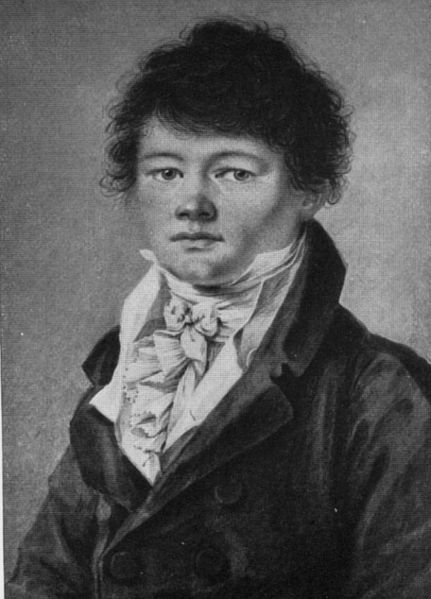<Back to Index>
- Philosopher Arthur Schopenhauer, 1788
- Composer Frédéric François Chopin, 1810
- First President of the United States George Washington, 1732



Arthur Schopenhauer (22 February 1788 – 21 September 1860) was a German philosopher known for his atheistic pessimism and philosophical clarity. At age 25, he published his doctoral dissertation, On the Fourfold Root of the Principle of Sufficient Reason,
which examined the fundamental question of whether reason alone can
unlock answers about the world. Schopenhauer's most influential work, The World as Will and Representation, emphasized the role of man's basic motivation, which Schopenhauer called will.
His analysis of will led him to the conclusion that emotional,
physical, and sexual desires can never be fulfilled. Consequently, he
favored a lifestyle of negating human desires, similar to the teachings
of ancient Greek Stoic philosophers, Buddhism, and Vedanta. Schopenhauer's metaphysical analysis of will, his views on human motivation and desire, and his aphoristic writing style influenced many well-known thinkers including Friedrich Nietzsche, Richard Wagner, Ludwig Wittgenstein, Erwin Schrödinger, Albert Einstein, Sigmund Freud, Otto Rank, Carl Gustav Jung, and Jorge Luis Borges.
Arthur Schopenhauer was born in the city of Danzig (Gdańsk) as the son of Heinrich Floris Schopenhauer and Johanna Schopenhauer, both descendants of wealthy German Patrician families. When the Kingdom of Prussia acquired the Polish-Lithuanian Commonwealth city of Danzig in 1793, Schopenhauer's family moved to Hamburg. In 1805, Schopenhauer's father committed suicide. Schopenhauer's mother Johanna shortly after moved to Weimar, then the centre of German literature, to pursue her writing career. After one year, Schopenhauer left the family business in Hamburg to join her. Schopenhauer became a student at the University of Göttingen in 1809. There he studied metaphysics and psychology under Gottlob Ernst Schulze, the author of Aenesidemus, who advised him to concentrate on Plato and Kant. In Berlin, from 1811 to 1812, he had attended lectures by the prominent post-Kantian philosopher J. G. Fichte and the theologian Schleiermacher. In 1814, Schopenhauer began his seminal work The World as Will and Representation (Die Welt als Wille und Vorstellung). He would finish it in 1818 and publish it the following year. In Dresden in 1819, Schopenhauer fathered an illegitimate child who was born and died the same year. In 1820, Schopenhauer became a lecturer at the University of Berlin. He scheduled his lectures to coincide with those of the famous philosopher G. W. F. Hegel, whom Schopenhauer described as a "clumsy charlatan". However,
only five students turned up to Schopenhauer's lectures, and he dropped
out of academia. A late essay, "On University Philosophy", expressed
his resentment towards university philosophy. While in Berlin, Schopenhauer was named as a defendant in an action at law initiated by a woman named Caroline Marquet. She
asked for damages, alleging that Schopenhauer had pushed her. According
to Schopenhauer's court testimony, she deliberately annoyed him by
raising her voice while standing right outside his door. Marquet
alleged that the philosopher had assaulted and battered her after she
refused to leave his doorway. Her companion testified that she saw
Marquet prostrate outside his apartment. Because Marquet won the
lawsuit, he made payments to her for the next twenty years. When she died, he wrote on a copy of her death certificate, Obit anus, abit onus ("The old woman dies, the burden flies"). In
1821, he fell in love with nineteen-year old opera singer, Caroline
Richter (called Medon), and had a relationship with her for several
years. He discarded marriage plans, however, writing, "Marrying means
to halve one's rights and double one's duties", and "Marrying means, to
grasp blindfolded into a sack hoping to find out an eel out of an
assembly of snakes." When he was forty-three years old, seventeen-year
old Flora Weiss recorded rejecting him in her diary. Schopenhauer
had a notably strained relationship with his mother Johanna
Schopenhauer. After his father's death, Arthur Schopenhauer endured two
long years of drudgery as a merchant, in honor of his dead father.
Afterwards, his mother retired to Weimar, and Arthur dedicated himself
wholly to studies in the gymnasium of Gotha. After he left it in
disgust after seeing one of the masters lampooned, he went to live with
his mother. But by that time she had already opened her infamous salon,
and Arthur was not compatible with the vain, ceremonious ways of the
salon. He was also disgusted by the ease with which Johanna had
forgotten his father's memory. Therefore, he gave university life a
shot. There, he wrote his first book, On the Fourfold Root of the
Principle of Sufficient Reasoning. She informed him that the book was
incomprehensible and it was unlikely that anyone would ever buy a copy.
In a fit of temper Arthur told her that his work would be read long
after the rubbish she wrote would have been totally forgotten. In 1831, a cholera epidemic broke out in Berlin and Schopenhauer left the city. Schopenhauer settled permanently in Frankfurt in
1833, where he remained for the next twenty-seven years, living alone
except for a succession of pet poodles named Atma and Butz.
Schopenhauer had a robust constitution, but in 1860 his health began to
deteriorate. He died of heart failure on 21 September 1860, while
sitting in his armchair at home. He was 72.